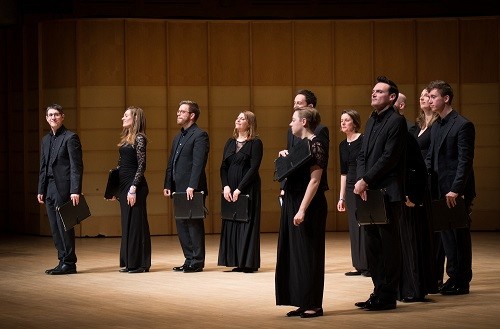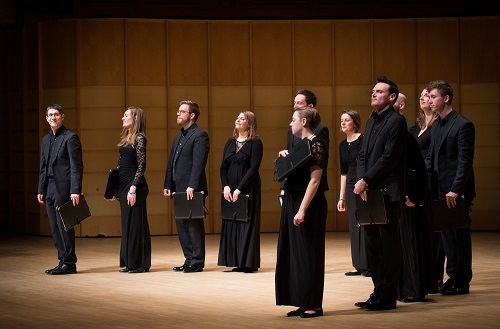 Canada Dowland, Byrd, Tallis et al: Stile Antico, Chan Centre, Vancouver, 5.3.2017. (GN)
Canada Dowland, Byrd, Tallis et al: Stile Antico, Chan Centre, Vancouver, 5.3.2017. (GN)

Dowland – ‘Flow my tears’; ‘In this trembling shadow cast’
de Monte – ‘Super Flumina Babylonis’
Byrd – ‘Quomodo cantabimus’; ‘Tristitia et anxietas’, ‘Haec Dies’
Dering – ‘Sancta et immaculata virginitas’; ‘Factum est silentium’
Tallis – ‘In ieiunio et fletu’
Philips – ‘Regina caeli laetare’; ‘Gaude Maria &Virgo prudentissima’
White – Lamentations a 5
One has been inspired by Stile Antico’s magnificent recordings over the past decade, but seeing these 12 singers in concert fully reveals the joy they get from performing their repertoire – in some ways living it whole. On this, their third visit here, the subject was religious persecution in the era of Elizabeth I, with a dominant theme of the need for Catholic composers to conceal their beliefs in England, or possibly seek refuge abroad. The historical narrative, introduced sequentially by different vocalists, immersed us in the political/musical fabric of this era, bringing to life the wonderful compositions of John Dowland, William Byrd and Thomas Tallis as well as the less familiar Richard Dering, Peter Philips and Robert White. One has to marvel at the effortless balance achieved among the individual voices in this ensemble; also, the many different stage arrangements of the male and female voices used to achieve this pristine result. It is the consistent shape and feeling in the group’s vocal lines and their acute sense of dynamics and transparency that proves so enticing and suspends the listener in the world they create.
The first half of the concert started from the lovely shape and flexibility in John Dowland’s ‘Flow my tears’ and proceeded through the antiphonal delights of Philip de Monte’s ‘Super Flumina Babylonis’, moving to greater energy and motion – and a true sweetness – in Richard Dering’s ‘Sancta et immaculate virginitas’. These pieces were special in displaying the variety in the group’s vocal talents; throughout one noticed the enthusiastic guidance of the Ashby siblings (Emma, Helen and Kate) in ensuring overall cohesion. Thomas Tallis’ ‘In ieiunio et fletu’ brought a sense of wonder which most certainly elevated the text. Perhaps the highlights in this half were the two pieces by William Byrd: ‘Quomodo cantabimus’ and ‘Tristitia et anxietas’, both encompassing subtle range and depth. The latter was spellbinding in it pianissimo concentration at the beginning, finding both nobility and the strongest feelings later.
After hearing these pieces, what came to me is how much of the ensemble’s singing mimics natural conversation: each voice has its individual story to tell but the ensemble is so finely and democratically balanced that everyone can speak simultaneously (and to each other) without interference. This is true even at the softest volumes. At the same time, one notes just how much reserve the group has: when they need to open out with great force, they are amazingly powerful and never lose their tonal body.
The second half produced additional felicities, starting with the rich firmness and discipline in Byrd’s ‘Haec Dies’ and the easeful fluency and life-giving sensibility in Peter Philips ‘Virgo prudentissima’. Dowland’s ‘In this trembling shadow cast’ had the innovation of split choirs – offstage and on – whose quiet responses to each other were impeccably balanced and deeply felt. Richard Dering’s ‘Factum est silentium’ added a contrasting animation and weight, developing real gravitas. Robert White (1538-1574) may have rested in the shadow of Thomas Tallis and William Byrd, but his longer and most worthy Lamentations completed the programme in fine style. The work fosters an attractive vocal variety over six sections and allowed the ensemble to open out its full range of capabilities: a rhythmic decisiveness in Heth; an enticing vocal freedom in Teth, a lovely tonal blend in Joth, a mix of wonder and defiance in Caph, strangely-veiled lines in Lamech and an overarching sense of resolution in Mem.
This concert achieved an exalted level of communication, and I doubt there was anyone in the audience that wasn’t spellbound by the end.
Geoffrey Newman
Previously published in a slightly different form on www.vanclassicalmusic.com.
